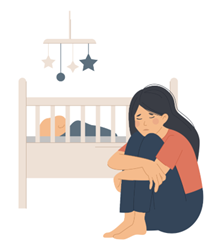Elisavet and Iona, PhD students in the EDIT Lab, write about women’s mental health in the perinatal period and the current interventions available.
Women are twice as like ly to experience mental health problems at some point in their lifetimes (Riecher-Rössler, 2017). However, there are certain periods of life when women may be even more vulnerable to experiencing mental health problems. One example is the perinatal period, which includes the time from conception and pregnancy until one year postpartum (Garcia & Yim, 2017). While women’s mental health issues clearly extend beyond the perinatal period, this blog will focus on perinatal mental health difficulties and support.
ly to experience mental health problems at some point in their lifetimes (Riecher-Rössler, 2017). However, there are certain periods of life when women may be even more vulnerable to experiencing mental health problems. One example is the perinatal period, which includes the time from conception and pregnancy until one year postpartum (Garcia & Yim, 2017). While women’s mental health issues clearly extend beyond the perinatal period, this blog will focus on perinatal mental health difficulties and support.
What is perinatal mental health?
 Perinatal mental health problems are common, with an estimated 10-20% of women developing a disorder during pregnancy or within the first year after giving birth (Howard & Khalifeh, 2020). For the interested readers, here is a blog by an ex-EDIT Lab student where she reflects on her postnatal anxiety and depression experiences. These mental health conditions may include severe (e.g. psychosis) or less severe (e.g. depression, anxiety, obsessive-compulsive disorder (OCD)) mental disorders (Antoniou et al., 2022). As with most mental health problems, perinatal mental health conditions and symptoms may develop quickly, vary in severity, or co-occur with other symptoms.
Perinatal mental health problems are common, with an estimated 10-20% of women developing a disorder during pregnancy or within the first year after giving birth (Howard & Khalifeh, 2020). For the interested readers, here is a blog by an ex-EDIT Lab student where she reflects on her postnatal anxiety and depression experiences. These mental health conditions may include severe (e.g. psychosis) or less severe (e.g. depression, anxiety, obsessive-compulsive disorder (OCD)) mental disorders (Antoniou et al., 2022). As with most mental health problems, perinatal mental health conditions and symptoms may develop quickly, vary in severity, or co-occur with other symptoms.
The transition to motherhood is a significant change, and women may respond differently to it. Around 50% of women may experience baby blues, including feeling low, tearful, stressed and irritable in the week after birth (Jones, 2012). Such symptoms are often due to hormonal and chemical changes that occur after childbirth. Baby blues or feelings of worry about being a new mother during pregnancy or after childbirth are normal. However, if these feelings persist it may be a sign of postpartum depression or perinatal anxiety for which support should be sought (Feeling Depressed after Childbirth, 2020).
Interventions
Women experiencing perinatal mental health difficulties can access help and support through several routes. GP services, midwives, health visitors and other primary care providers can provide referrals to specialist community perinatal mental health teams. These teams can deliver psychological therapies tailed towards perinatal mental health problems, as well as provide advice about taking psychiatric medication during pregnancy and breastfeeding. They can also support women and their families by providing pre-conception counselling for women at high-risk for perinatal mental health difficulties, such as those with current or past experience of mental health disorders.
Women with more severe perinatal mental health difficulties, or pre-existing mental health conditions, may also be referred to a Mother and Baby Unit. This is a type of in-patient ward where women can stay with their baby while receiving treatment, which helps to build the crucial bond between mother and child. Specialist staff also support women in looking after their baby, and build their confidence and independence as mothers.
Support is also available through charities, such as PANDAS, Family Action, and MumsAid.
The changing landscape of perinatal mental health care in the UK
In 2010, over 40% of areas did not provide any perinatal health services, leading to patchy availability of evidence-based treatment and support (NHS England et al., 2018). In 2014, an independent report estimated that perinatal depression and anxiety were undetected in approximately half of cases, in part due to a lack of specialist services (Bauer et al., 2014).
Following these reports, NHS England launched the Five Year Forward View Plan, which aimed to improve specialist perinatal mental health services across the country including establishing new Mother and Baby units and community perinatal mental health teams (NHS England et al., 2018).
These ambitious goals have improved access to maternal mental health care. Since 2019, every local area of England has had an active community perinatal health service, and four additional Mother and Baby units have opened in regions of particularly high need. In the last 12 months, over 50,000 women have accessed specialist perinatal mental health care, and investment into perinatal mental health services is ongoing (NHS England; NHS England & NHS Improvement, 2020).
Other considerations about women’s mental health
Perinatal mental health is a broad topic, and we acknowledge that individuals’ experiences differ. For example, childbearing transgender and non-binary people face additional and unique challenges during the perinatal period which may affect their mental health, including discrimination, heightened gender dysphoria, and isolation (Greenfield & Darwin, 2020). Similarly, women from minority ethnic backgrounds may be less able to access perinatal mental health care due to stigma and lack of cultural competency among clinicians (Watson et al., 2019).
Many women are also affected by infertility and pregnancy loss, which has been associated with poor mental health (Sharma & Shrivastava, 2022). The perinatal period is a time of heightened risk for experiencing mental health difficulties. Targeted support, treatment and healthcare resources are essential to support the mental health of people during the transition to parenthood.
More EDIT Lab blogs on perinatal mental health:
Perinatal Mental Heath: #MumTakeOver
EDIT lab blog on mental health among people from minority racial/ethnic groups
Read more below
ANTONIOU, E., TZANOULINOU, M.-D., STAMOULOU, P., & OROVOU, E. (2022). The Important Role of Partner Support in Women’s Mental Disorders During the Perinatal Period. A Literature Review. Mædica, 17(1), 194–200. https://doi.org/10.26574/maedica.2022.17.1.194
Bauer, A., Parsonage, M., Knapp, M., Iemmi, V., & Adelaja, B. (2014). The costs of perinatal mental health problems.
Feeling depressed after childbirth. (2020, December 7). Nhs.Uk. https://www.nhs.uk/conditions/baby/support-and-services/feeling-depressed-after-childbirth/
Garcia, E. R., & Yim, I. S. (2017). A systematic review of concepts related to women’s empowerment in the perinatal period and their associations with perinatal depressive symptoms and premature birth. BMC Pregnancy and Childbirth, 17(2), 347. https://doi.org/10.1186/s12884-017-1495-1
Greenfield, M., & Darwin, Z. (2020). Trans and non-binary pregnancy, traumatic birth, and perinatal mental health: A scoping review. International Journal of Transgender Health, 22(1–2), 203–216. https://doi.org/10.1080/26895269.2020.1841057
Howard, L. M., & Khalifeh, H. (2020). Perinatal mental health: A review of progress and challenges. World Psychiatry, 19(3), 313–327. https://doi.org/10.1002/wps.20769
Jones, I. (2012). Perinatal psychiatry. Medicine, 40(12), 654–657. https://doi.org/10.1016/j.mpmed.2012.09.001
NHS England. (n.d.). NHS mental health dashboard. Retrieved 19 October 2023, from https://www.england.nhs.uk/mental-health/taskforce/imp/mh-dashboard/
NHS England & NHS Improvement. (2020). Better Births Four Years On: A review of progress. https://www.england.nhs.uk/wp-content/uploads/2020/03/better-births-four-years-on-progress-report.pdf
NHS England, NHS Improvement, & National Collaborating Centre for Mental Health. (2018). The Perinatal Mental Health Care Pathways. https://www.england.nhs.uk/wp-content/uploads/2018/05/perinatal-mental-health-care-pathway.pdf
Riecher-Rössler, A. (2017). Sex and gender differences in mental disorders. The Lancet Psychiatry, 4(1), 8–9. https://doi.org/10.1016/S2215-0366(16)30348-0
Sharma, A., & Shrivastava, D. (n.d.). Psychological Problems Related to Infertility. Cureus, 14(10), e30320. https://doi.org/10.7759/cureus.30320
Watson, H., Harrop, D., Walton, E., Young, A., & Soltani, H. (2019). A systematic review of ethnic minority women’s experiences of perinatal mental health conditions and services in Europe. PLOS ONE, 14(1), e0210587. https://doi.org/10.1371/journal.pone.0210587



